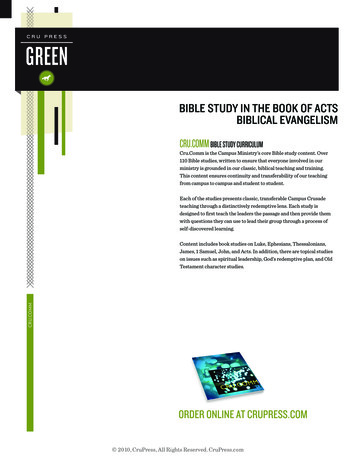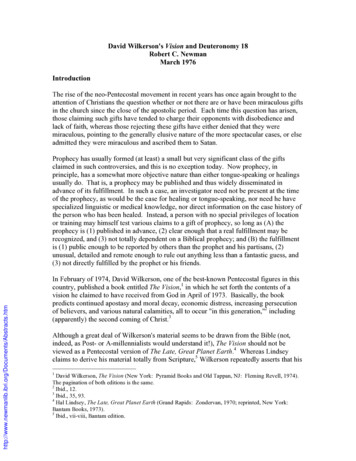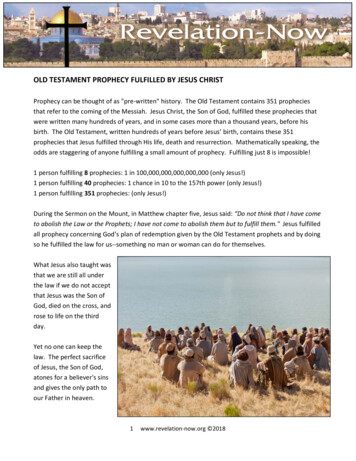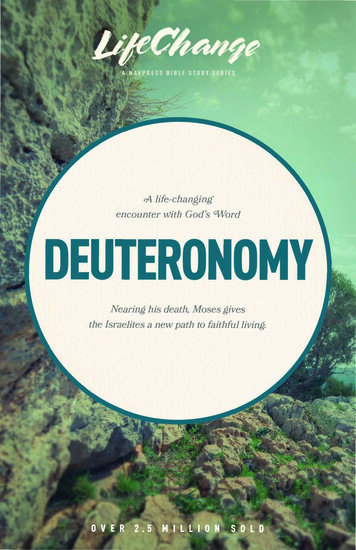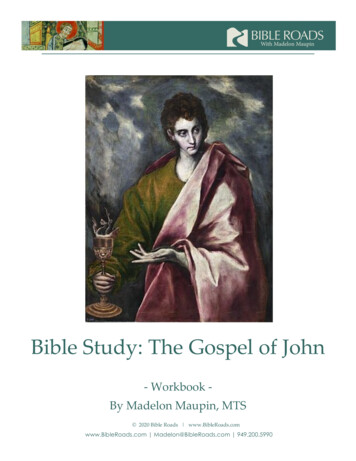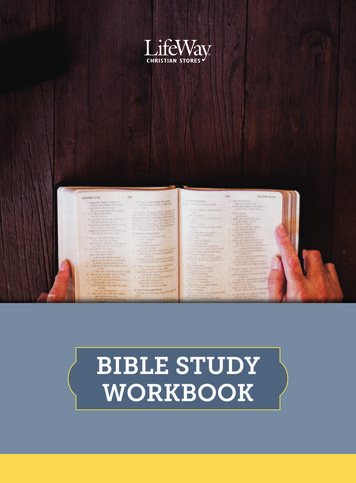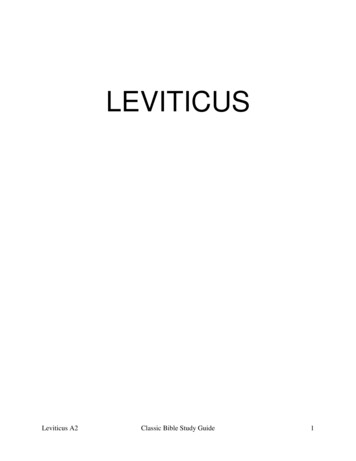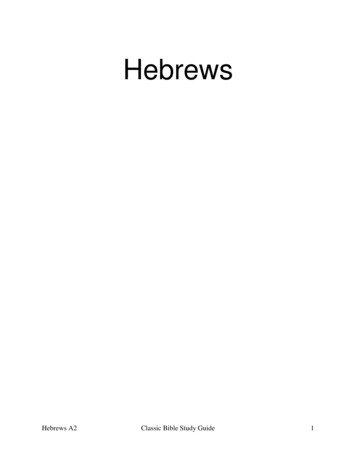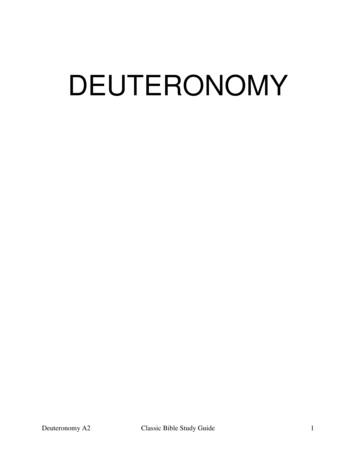
Transcription
DEUTERONOMYDeuteronomy A2Classic Bible Study Guide1
INTRODUCTIONThe book consists of four parts:1. An introductory address delivered by Moses on the plains of Moab, containing a recapitulation of the principal events ofthe history and closing with a solemn charge of obedience and faithfulness to God. This is recorded in the first fourchapters, commencing with 1:6, and closing with 4:43. This might be called retrospective.2. Then follows a long address from 4:44 to 26:19, which might be called didactic and hortatory. This consists of asummary of the principal precepts of the Law, and a collection of important statutes and laws, with respect to their nationaland individual life; especially when they enter the Land of Promise. This is interspersed with several brief narrativesrespecting a portion of their wilderness life already past.3. Then follows a shorter address from 27:1 to 30:20, mostly prospective in its character: referring, especially, to theinscription of the Law on pillars of stone on Mounts Ebal and Gerizim, with the blessings and the curses after they shouldenter the land. This is followed by a solemn declaration of the punishments and recompenses which will most surelyfollow their disobedience or obedience to the commandments of God, and a solemn appeal to them, as a people, tochoose the way to obedience and life.4. The last section of Deuteronomy, comprising chapters 31-34, contains a brief account of the closing scenes of Moses'life, including the appointment of Joshua, provision for the reading of the Law, the song of Moses and his parting blessingupon the tribes, closing with the account of the death, burial and eulogy of the great lawgiver.Some of Christ's most important quotations from the Old Testament were directly from the book of Deuteronomy. Heuses the authoritative expression, “It is written," as He quotes from Deuteronomy 8:3; 6:13, 16, on important occasions(Matthew 4:4, 7 and 10). So, again, Matthew 22:24, compared with Deuteronomy 25:5. So again, Matthew 19:7-8; Mark10:3-4; John 5:46-47. Again in Acts, Peter quotes from this book (3:22-23); Stephen also (7:37); and Paul (Romans10:19; 12:19; Galatians 3:10).(The Christ in the Bible Commentary, A. B. Simpson)Deuteronomy A2Classic Bible Study Guide2
Deuteronomy 1:1-4:43MOSES’S FIRST ADDRESS ON THE PLAINS OF MOABDeuteronomy 1:1-4:43RetrospectiveThis address is introduced in the five opening verses of the book by a simple historical reference to the circumstancesin which it was given. It was spoken on the plain of Moab "in the fortieth year, on the first day of the eleventh month"(Deuteronomy 1:3), after their victory over Sihon, king of the Amorites, and over the king of Bashan. It contains a strikinglittle parenthesis which is more emphatic than the whole chapter (verse 2): "It takes eleven days to go from Horeb toKadesh Barnea by the Mount Seir road." This little sentence stands in contrast with the 40 years of their wandering, and isa hint of what might have been had they promptly believed and obeyed God. Alas! many a journey in our Christianpilgrimage is made a thousandfold more sad and long by our refusing to obey the Lord.The address proper consists of two portions; first, a recapitulation of their history up to the present time (1:6 to 3:29);and secondly, an exhortation to obedience (4:1-43).SECTION 1—RecapitulationDeuteronomy 1-3Departure From HorebMoses goes back to their departure from Horeb (1:6-8), and their setting out for the land of promise. "You havestayed long enough at this mountain" (1:6) is the Lord's message.Break camp and advance into the hill country of the Amorites; go to all the neighboring peoples in the Arabah, inthe mountains, in the western foothills, in the Negev and along the coast, to the land of the Canaanites and toLebanon, as far as the great river, the Euphrates. See, I have given you this land. Go in and take possession of theland that the LORD swore he would give to your fathers—to Abraham, Isaac and Jacob—and to their descendantsafter them. (1:7-8)Here there is no long interval, no weary wilderness march even suggested; the land is right before them as God'simmediate purpose for them to inherit; and back of the command stands the oath of God to their fathers. It was well that itwas so, for had it not been for their sakes the promise would have been of no effect; but when they forfeited their claim,the covenant with Abraham still stood fast, and by virtue of it their children entered in. It is well for us that the covenant isnot with us and the mercy of God is not for our sakes, but wholly on account of the Lord Jesus Christ, our covenant Head."For God's gifts and his call are irrevocable" (Romans 11:29).Organization Of The CampMoses next refers to his plan for the organization and government of the host.The multitude had grown so vast that it was necessary that there should be a system of administration in detail. Thiswas rendered the more necessary by what Moses pathetically refers to as their burden and their strife. Alas! it was thiselement of human self-will, discontent and murmuring, which caused most of his burdens and their sorrows. This, alas! isstill true. It is not our troubles that burden the Master, but our strife. To meet the innumerable cases of complaint andlitigation that would arise, Moses appointed judges and commanders "of thousands, of hundreds, of fifties and of tens"(Deuteronomy 1:15) and laid upon them the most solemn charges with regard to the patient and righteous administrationof justice in all the minor difficulties that might arise. He reserved to himself for personal decision the cases that mightprove too complicated for them. We have here a wise example of the importance of a careful, thorough organization inthe work of the Church of Christ.George Whitefield once said: "The Lord gave me as great a work as John Wesley, but he organized and I did not; theresult was his became an enduring system, and mine, so far as visible and organic results were concerned, a rope ofsand."Through The WildernessHe next recalls their journey through the wilderness from Horeb to Kadesh Barnea. "Then, as the LORD our Godcommanded us, we set out from Horeb and went toward the hill country of the Amorites through all that vast and dreadfuldesert that you have seen, and so we reached Kadesh Barnea" (1:19).The remembrance still seems to cause a shudder of horror as he speaks of the great and terrible wilderness. Likethem we too must pass into our inheritance through a waste and desolate region of separation from the world andcrucifixion with Christ. But it need not be long. It was only 11 days' journey, and it was utterly unnecessary that theyshould return to it again and again and wander in it for the remaining 40 years. And so we too must pass through theearlier conflicts which meet us into a deeper rest; yet the ordeal need not be long, and certainly need not be renewed andDeuteronomy A2Classic Bible Study Guide3
prolonged through all the weary pilgrimage of life. He that is brave enough to pass quickly through the border land andutterly to follow the Lord will find that this is the secret of a peaceful and happy life, free from the struggles and conflictswhich should be settled at the beginning. But he who is afraid utterly to die and wholly to obey will find his whole life along and ineffectual struggle of useless misery.The CrisisThe crisis of their history has now come.Then I said to you, "You have reached the hill country of the Amorites, which the L ORD our God is giving us. See,the LORD your God has given you the land. Go up and take possession of it as the L ORD, the God of your fathers, toldyou. Do not be afraid; do not be discouraged." (1:20-21)This represents the crisis hour in our Christian life when the soul comes face to face with the question of entireconsecration and entering into the fullness of Christ's blessing. It is a moment that never will come again, and on whichthe issues of a lifetime hang. Happy are they who stop not to reason and compromise, but literally go up at once andpossess it.Their First CompromiseThey began to reason about the promise of the Lord.Then all of you came to me and said, "Let us send men ahead to spy out the land for us and bring back a reportabout the route we are to take and the towns we will come to."The idea seemed good to me; so I selected twelve of you, one man from each tribe. They left and went up into thehill country, and came to the Valley of Eshcol and explored it. Taking with them some of the fruit of the land, theybrought it down to us and reported, "It is a good land that the LORD our God is giving us." (1:22-25)Alas! they now made the fatal mistake of beginning to reason about that which the Lord had distinctly promised andcommanded. They came to Moses and proposed that the spies should be sent up to reconnoiter the land, and bring wordagain concerning the country and the way by which they should go. While, on the superficial view, this looks plausibleenough as a human proposition, yet as a people supernaturally led by the very hand of God, such a resort to mere humanwisdom was inconsistent and dangerous. If the Lord was to lead them what need had they of man's counsels? And if theLord had told them what the land was, how dared they question it even sufficiently to try to find it out by human wisdom?And yet, even Moses was caught in the snare, and admits in his address, "The idea seemed good to me" (1:23). He evenwent to God and obtained the divine permission for this arrangement. God Himself allowed it to test their faith and showthe folly of leaning on human understanding and the mistake which even the best of men are sure to make when they failto act upon the simple principles of obedience and faith.The spies were able to successfully accomplish their inspection and even to bring back with them a sample of thewonderful products of the land. And surely this ought to have been at least a pledge that the dangers were not insurmountable, if 12 men could go safely through this foreign territory.RebellionTheir compromise was followed speedily by a bolder step of disobedience and rebellion.But you were unwilling to go up; you rebelled against the command of the L ORD your God. You grumbled in yourtents and said, "The LORD hates us; so he brought us out of Egypt to deliver us into the hands of the Amorites todestroy us. Where can we go? Our brothers have made us lose heart. They say, 'The people are stronger and tallerthan we are; the cities are large, with walls up to the sky. We even saw the Anakites there.' " (1:26-28)They did not question the merits of the land but their cowardly hearts were afraid of the perils of the way. "Ourbrothers have made us lose heart. They say, 'The people are stronger and taller than we are; the cities are large, withwalls up to the sky. We even saw the Anakites there' " (1:28). Discouragement soon led to darker thoughts of God, andthey dared to say, "The LORD hates us; so he brought us out of Egypt to deliver us into the hands of the Amorites todestroy us" (1:27).So, still, the unbelief of God's people does not question the excellency of His promises or the reality of divine thingsand of the higher possibilities of Christian life, but it questions their own ability to live such a life, and faints before thedangers and temptations of the way and the helplessness of their own weakness and sinfulness; leaving God Himselfquite out of view and forgetting that He is greater than all difficulties and mightier than all our weakness.Moses’ AppealMoses appeals to them with this very thought.Deuteronomy A2Classic Bible Study Guide4
"Then I said to you, 'Do not be terrified; do not be afraid of them. The L ORD your God, who is going before you, willfight for you' " (1:29-30), and then he reminds them of their own previous experience of His victorious power "as he did foryou in Egypt,. . . and in the desert. There you saw how the L ORD your God carried you, as a father carries his son, all theway you went" (1:30-31).This is the ground of our confidence for all our spiritual victories; this is the answer to all our difficulties and all ourfears; we are not sufficient for anything, but Christ is all-sufficient, and we "can do everything through him who gives [us]strength" (Philippians 4:13). When the soul sees the living Christ and His infinite resources, it has the pledge of perfectvictory. They could not see God because their eyes were full of their enemies and their own insignificance.Their UnbeliefAnd so the crisis ends in utter unbelief and disobedience."In spite of this, you did not trust in the L ORD your God" (1:32). This is the root of all disobedience and sin. The fall ofman at first sprang from doubting God. Salvation begins with the recovery of our lost faith, as apostasy always originatesin some form of faithlessness. Let us "see to it, brothers, that none of you has a sinful, unbelieving heart that turns awayfrom the living God" (Hebrews 3:12).God’s RejectionTheir unbelief is immediately followed by the divine rejection (Deuteronomy 1:34-40).When the LORD heard what you said, he was angry and solemnly swore: "Not a man of this evil generation shall seethe good land I swore to give your forefathers, except Caleb son of Jephunneh. He will see it, and I will give him andhis descendants the land he set his feet on, because he followed the LORD wholeheartedly." (1:34-36)That whole generation is refused by an angry God and consigned to an ignominious grave in the wilderness, and theirlittle children, for whom they pretended to be afraid, are chosen to inherit the land which they refused. The onlyexceptions to this sweeping sentence of exclusion are Joshua and Caleb, the two faithful spies, who stood alone in thedark and awful hour of their people's revolt and pleaded with them at the risk of their lives to trust and obey Jehovah andgo up at once and possess the land. Even Moses himself intimates that his own exclusion was in some measure due tothe people's sin: "Because of you the LORD became angry with me also" (1:37).It was their perverse spirit which provoked the meek and gentle lawgiver and for once in his life seemed to infect evenhim with the spirit of their unbelief. And, as the law could show no mercy even to its author he must become a monumentof its inexorable severity.Their Remorse And RecklessnessThe reaction from their desperate act soon comes and leads them into an attitude of presumption as wicked as theircowardice had been before.Then you replied, "We have sinned against the LORD. We will go up and fight, as the LORD our God commandedus." So every one of you put on his weapons, thinking it easy to go up into the hill country.But the LORD said to me, "Tell them, 'Do not go up and fight, because I will not be with you. You will be defeated byyour enemies.' "So I told you, but you would not listen. You rebelled against the L ORD's command and in your arrogance youmarched up into the hill country. The Amorites who lived in those hills came out against you; they chased you like aswarm of bees and beat you down from Seir all the way to Hormah. You came back and wept before the L ORD, buthe paid no attention to your weeping and turned a deaf ear to you. (1:41-45)As soon as they find that they have lost the inheritance through their wickedness, they go to the opposite extreme ofremorse and regret, acknowledge their sin and offer immediately to go forward. But this is only the passionate impulse ofthe sorrow that works death; and even had God met them in this position they would signally have failed, and soon afterproved that they did not possess any permanent element of true repentance or faith. And so He righteously refuses toallow them to go forward; they have chosen the issue and they must meet it. They soon show that their spirit is not trulychastened or penitent, by refusing to obey the warning of Moses, and rushing presumptuously forward against the enemy.They are terribly defeated and smitten by the Amorites and driven back in confusion and despair. So the willful andunbelieving heart swings from the extreme of doubt to that of daring presumption; attempts to do in its own strength whatit had refused to do in the Lord's, and is met with desperate failure and disaster.There is a time, we know not when,A place, we know not where,That marks the destiny of menFor glory and despair.Deuteronomy A2Classic Bible Study Guide5
Let none of us trifle with God's nows; but today, while it is called today, if we will hear His voice, let us harden not ourhearts (Hebrews 3:13, 15). There is a sorrow that has no healing in it; a remorse that has no repentance in it, a weepingthat has no softening, sanctifying power; a grief that even God has no compassion for, because it is the cry of a willful,proud and sinful heart; as self-willed in its weeping as it was in its defiance. What infinite pathos and despair there is inthe closing words: "You came back and wept before the L ORD, but he paid no attention to your weeping and turned a deafear to you" (Deuteronomy 1:45).Wasted YearsThe Interval spent in Kadesh became wasted years.“And so you stayed in Kadesh many days—all the time you spent there" (1:46).How long they remained in Kadesh after this melancholy occurrence we do not know, and the narrative reads as if itdid not matter much. There are chapters in life's history that are as blank and cold as the face of an iceberg. They countfor nothing in the annals of God and eternity; they are simply, bitterly and utterly vague—barren and empty as the desertwind. What a suggestive meaning there is in this sentence, "And so you stayed in Kadesh many days—all the time youspent there" (1:46). That is to say that there were just so many days and they were counted simply by the number ofdays, and not by any event of the slightest interest or importance. They were just passed by and that was all. They werenot according to the will of God, or according to the plan of His love and ordering, or according to the useful service withwhich they were filled, but they were just according to the number of the days. They had 38 years to throw away, to finishthe tramp of their vain and lost existence, and it seemed to be little matter where they spent them.Oh! it is pitiful to be living a life with God above us, immortality within us and eternity before us with such an awfulrecord of vanity; and yet, such is the life of all who live not for God. They are just filling up the time until the next chapter,the long, the sad eternity.The Wilderness AgainThe wandering in the wilderness is even sadder.This is, if possible, still more sad. "Then we turned back and set out toward the desert along the route to the Red Sea,as the LORD had directed me. For a long time we made our way around the hill country of Seir" (2:1).A single verse completes the history of 3 million people for 38 years. "Then we turned back and set out toward thedesert along the route to the Red Sea, as the LORD had directed me. For a long time we made our way around the hillcountry of Seir" (2:1). What a mournful picture; still more desolate as the speaker draws it out into days rather than years.Oh! how long and dreary they must have seemed to him in retrospect. Nearly 14,000 days of useless ineffectualwandering, and that when he himself was nearly 80 years old, and was wasting the last 38 years of his already almostfinished life in this dreary land. In the 90th Psalm he has given us some conception of those scenes: "All our days passaway under your wrath; we finish our years with a moan" (90:9). Day by day and year by year he saw them fading beforehis eyes. Fathers and mothers wandered in the burning sands with their thirsty little ones, and saw one and another oftheir neighbors faint and sink amid the sands, gasp out their lives, and leave their bones to whiten in the desert, and theyknew that soon their turn would come; for them there was no prospect but death.Oh! how vivid a picture it is of the emptiness and failure of the Christian life which hesitates wholly to follow the Lordand to enter into the fullness of our inheritance. There will be very little history for many lives. One single verse in thebook of Numbers (33:37) tells the story of most of the 40 years as we have already seen in that book. This very verse isthe sole memorial, in the address of Moses, of that melancholy time from which his thoughts would gladly turn away. It isa chapter from the annals of eternity, and such awful blanks will meet many of us, it is to be feared, when we come face toface with the issues of life and the books of the judgment.The New Departure"Then the LORD said to me, 'You have made your way around this hill country long enough; now turn north' " (2:2-3).The 38 years of wandering have about passed; and now the command comes to turn northward from the territory ofEdom toward the land of promise. The last days of the wilderness are spent in passing through, for the last time, theterritory of the Edomites. Their first aggressive work is now to begin. Through many adversaries they are to fight theirway into their inheritance.The EdomitesThe Edomites are not to be attacked.Give the people these orders: "You are about to pass through the territory of your brothers the descendants ofEsau, who live in Seir. They will be afraid of you, but be very careful. Do not provoke them to war, for I will not giveyou any of their land, not even enough to put your foot on. I have given Esau the hill country of Seir as his own."(Deuteronomy 2:4-5)Deuteronomy A2Classic Bible Study Guide6
They are their own brethren, the race of Esau, and their territory is not to be disturbed because of the covenant withEsau. They are to deal honestly by them and pay for all which they shall require, both food and drink; even theirinhospitality is not to be avenged, but they are to be treated with forbearance and justice, even as the children of Godtoday should act in all their dealings with the world and even with those that are most unkind and selfish.The MoabitesThe Moabites also are spared because they are the descendants of Lot, and thus distantly related to the Hebrewrace.So we went on past our brothers the descendants of Esau, who live in Seir. We turned from the Arabah road, whichcomes up from Elath and Ezion Geber, and traveled along the desert road of Moab.Then the LORD said to me, "Do not harass the Moabites or provoke them to war, for I will not give you any part oftheir land. I have given Ar to the descendants of Lot as a possession." (2:8-9)The Years Of WanderingHere the narrative pauses a moment to mark the close of the 38 years of wandering.Thirty-eight years passed from the time we left Kadesh Barnea until we crossed the Zered Valley. By then, thatentire generation of fighting men had perished from the camp, as the L ORD had sworn to them. The LORD's hand wasagainst them until he had completely eliminated them from the camp. (2:14-15)As they cross the brook Zered, on the borders of Moab, the last of the unbelieving generation has passed away, andMoses sets up a memorial stone, as it were, in the record, to mark the beginning of the new departure and to recognizethe hand of God in the solemn and awful dissolution of a whole generation. He adds, "The L ORD's hand was against themuntil he had completely eliminated them from the camp" (2:15). "That entire generation of fighting men had perished fromthe camp, as the Lord had sworn to them" (2:14). How very dreadful it is to have the hand of the Lord against us; not oneof all those millions escaped. Patiently His judgment waited until the work was thoroughly finished, and every soul wassifted from among the whole population. God's purposes, both of blessing and of judgment, are as immutable as eternity.Happy is he who has that mighty Hand upon his side.The AmmonitesThey next pass the territory of the Ammonites.The LORD said to me, "Today you are to pass by the region of Moab at Ar. When you come to the Ammonites, donot harass them or provoke them to war, for I will not give you possession of any land belonging to the Ammonites. Ihave given it as a possession to the descendants of Lot." (2:17-19)And they, too, share the same immunity which their brethren, the Moabites, received on account of their relationshipwith Israel. Some important incidents of the earlier history both of the Moabites, Ammonites and Edomites, are hereinterspersed, giving us an account of how these tribes had dispossessed the former inhabitants, which were of the race ofthe giants, and had occupied their territory.Their First CampaignThe first aggressive movement follows immediately after this.Set out now and cross the Arnon Gorge. See, I have given into your hand Sihon the Amorite, king of Heshbon, andhis country. Begin to take possession of it and engage him in battle. This very day I will begin to put the terror andfear of you on all the nations under heaven. They will hear reports of you and will tremble and be in anguish becauseof you. (2:24-25)God would not let them fight until the old generation had all passed away. Now with a new race they enter upon theircareer of victory. It is not until the old generation in our heart has died that we can fight the battles of the Lord or claim thevictories of faith. And so, immediately after the 38 years are ended, they commence the irrepressible conflict which is tobe consummated on the other side of the Jordan.Their first antagonist is Sihon, the king of the Amorites; and he is permitted to bring upon himself the conflict whichends in his destruction. A courteous message is sent to him asking permission to pass through the territory, andpromising to respect the rights of person and property, and to buy honorably all supplies that may be needed. Sihon metthe request with a hostile army and disputed the passage at Jahaz, but was utterly defeated, his whole race exterminated,the spoil of his rich land confiscated, and all his fortified cities captured and held. This was Israel's first aggressive victory,Deuteronomy A2Classic Bible Study Guide7
and it must have been an unspeakable inspiration to the long discouraged and passive tribes, as well as an acquisition ofinvaluable territory and extensive and costly possessions.This, as well as the subsequent victory, represents the conflicts and triumphs into which the Lord leads His people,even before they cross the Jordan in the full experience of death and resurrection life. The death of the old generationand the advent of the new perhaps represents the new life and birth in Christian experience, while the passage throughthe Jordan symbolizes the deeper experience of death and resurrection into which the converted soul passes afterwards,before its full inheritance of the land of promise. Israel had many glorious experiences even on the wilderness side of theJordan; and so the children of God may pass through much victory and blessing even before they enter into the fullmeaning of death and resurrection with Christ. Most of their victories occur just as this conflict with Sihon occurred, out ofthe obstacles met with in the ordinary course of life. It was the refusal of Sihon to grant them a polite request which led tothe possession of his entire territory. And so, the things that we call hindrances, difficulties and even injuries are the veryoccasions out of which God desires to bring, if we would only let Him, the most glorious triumphs of our experience.The Second CampaignThe conflict with Og and Bashan next follows.Next we turned and went up along the road toward Bashan, and Og king of Bashan with his whole army marchedout to meet us in battle at Edrei. The LORD said to me, "Do not be afraid of him, for I have handed him over to youwith his whole army and his land. Do to him what you did to Sihon king of the Amorites, who reigned in Heshbon."So the LORD our God also gave into our hands Og king of Bashan and all his army. We struck them down, leavingno survivors. (3:1-3)His was a still more valuable territory than that of the Amorites, including Bashan and Gilead. He was the last of theprimitive race of giants and his tremendous stature may well suggest some of the formidable adversaries which confrontus in our earlier experiences. Every one of them may become a trophy as valuable and yield us an inheritance asprecious, as their position was threatening.Division Of The New TerritoryNext comes the distribution of Gilead and Bashan among the two and a half tribes.Of the land that we took over at that time, I gave the Reubenites and the Gadites the territory north of Aroer by theArnon Gorge, including half the hill country of Gilead, together with its towns. The rest of Gilead and also all ofBashan, the kingdom of Og, I gave to the half tribe of Manasseh. (The whole region of Argob in Bashan used to beknown as a land of the Rephaites. Jair, a descendant of Manasseh, took the whole region of Argob as far as theborder of the Geshurites and the Maacathites; it was named after him, so that to this day Bashan is called HawothJair.) And I gave Gilead to Makir. But to the Reubenites and the Gadites I gave the territory extending from Gileaddown to the Arnon Gorge (the middle of the gorge being the border) and out to the Jabbok River, which is the borderof the Ammonites. Its western border was the Jordan in the Arabah, from Kinnereth to the Sea of the Arabah (the SaltSea), below the slopes of Pisgah.I commanded you at that time: "The LORD your God has given you this land to take possession of it. But all yourable-bodied men, armed for battle, must cross over ahead of your brother Israelites. However, your wives, yourchildren and your livestock (I know you have much livestock) may stay in the towns I have given you, until the L ORDgives rest to your brothers as he has to you, and they too have taken over the land that the L ORD your God is givingthem, across the Jordan. After that, each o
Deuteronomy A2 Classic Bible Study Guide 2 INTRODUCTION The book consists of four parts: 1. An introductory address delivered by Moses on the plains of Moab, containing a recapitulation of the principal events of the history and closing with a solemn charge of obedience an


